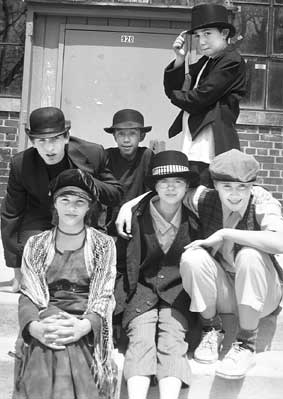                                    
       
|
|
Antioch
School to present ‘Oliver’
 |
|
PHOTO BY DIANE CHIDDISTER
Members of the cast of the Antioch School’s spring musical
‘Oliver,’ front row, from left: Crystal Reedy, Claire
Triplett and Ryder Comstock; back row: Jesse Rothman, Polo Chaikwang
and David Byrne.
|
It’s customary,
in the spring, for schools to put on a big theater production.
It’s less customary, though, for a school to put on a musical in
the manner of the Antioch School. A school dedicated to student-directed
learning, the Antioch School presents a yearly musical in which young
children not only star, but also make most of the production decisions.
The school will present this year’s musical, Oliver, Friday and Saturday,
May 9 and 10, at 7 p.m. at the Antioch Theater. The production is free
and open to the public.
The play will feature about 50 Antioch School students, from the nursery
school to the Older Group, which includes fourth, fifth and sixth grades.
Featured in main roles will be Ryder Comstock as Oliver, Polo Chaikwang
as Fagin, Claire Triplett (Friday) and David Byrne (Saturday) as the Artful
Dodger, Crystal Reedy as Nancy and Jesse Rothman as Bill Sykes.
This Monday, controlled chaos reigned as students descended on the Antioch
Theater for final rehearsals.
“I feel like Cecil B. De Mille,” said Older Group teacher Chris
Powell, who directs the production. “It’s a cast of thousands.”
While Powell was clearly in charge of the masses, she relied on others
for help. And aside from the assistance of retired teacher Bill Mullins,
most of the help came from the school’s older students, who worked
with younger children.
Ryder Comstock, for instance, not only has the starring role, but also
has created the show’s choreography. On Monday she led a group of
girls in a basket dance, trying to work out details such as how to swing
the baskets without dropping the fish inside.
“Chris thought it would be a good match. It’s something that’s
in me,” Ryder said about her teacher’s request that she not
only teach the show’s dancing, but also create it.
“I went home and watched the movie and saw a bunch of opportunities
to work out dances,” she said. “I’d get an idea and try
it out.”
Student involvement in the decision-making begins months before the musical
is presented, when the Older Group decides whether it wants to put on
a musical.
“They always decide they want to,” Powell said.
Then the group studies possible plays to perform, with students bringing
in favorites. Students vote on a production, with the sixth graders getting
the first vote, since it’s their last year in the school.
Sixth graders also get the starring roles. But rather than auditioning
in front of a teacher, students study the play and decide the role they
want. They get the role they ask for, said Powell, and if more than one
student wants the same role, they figure out how to work it out.
For instance, the two students who wanted to play the Artful Dodger decided
to split the role. Students might also decide to draw names, or split
the lines, or find another method of sharing a role. Students are expected
to figure out how to resolve the dilemma, Powell said.
“In this town we have lots of opportunities for children to get roles
by auditioning,” she said. “But in order to develop the skill
of auditioning, everyone needs the opportunity to have a lead role if
they want one. This way, everyone has a chance to shine.”
Older Group students also decide which songs to sing, help create the
costumes and build the sets. This year, they also revised many of the
play’s lines.
Such ownership of the process helps children learn to trust themselves,
Powell said. “What happens in a play is the building of self-confidence,
the understanding that if you want to do something and you work hard,
you can eventually do it,” she said. “It’s one of the huge
life skills that children get from this process.”
Older Group students know the process is unusual. “For other kids’
plays, teachers decide things,” Polo said. “But mostly we have
a say in everything.”
Jesse said that he likes the way the process encourages a feeling of independence.
And, with so much input into the process, the kids feel a strong sense
of ownership on opening night.
“After the show, there’s a feeling of accomplishment,”
Ryder said. “And there’s also a really good party.”
—Diane
Chiddister
|



